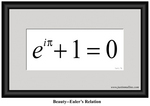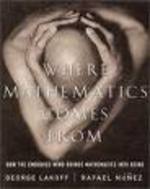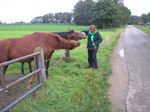Waar komt de wiskunde vandaan? II
 Metafoor op metafoor op metafoor ..... gestapeld. En aldus drukt het theorema van Euler met behulp van deze 5 getallen ("pi", i, e, 1, 0) conceptuele verbindingen tussen verschillende "gebieden" van de wiskunde uit. En de manier waarop deze gebieden van de wiskunde met elkaar samenhangen komt voort uit de wijze waarop wij de voor ons belangrijke idee?n conceptualiseren. Met andere woorden, de manier waarop wij dat doen hangt samen met wat voor ons van belang is in het leven en hoe we die belangen omzetten in conceptuele metaforen. En dit heeft niets te maken met de "romance of mathematics": menselijke wiskunde, de enige wiskunde die mensen kennen, kan niet een ondersoort zijn van een abstracte, trancedente wiskunde ("whatever that means" S). In plaats daarvan ontspruit de wiskunde die wij kennen aan de natuur van onze hersenen en onze fysieke ervaringen. Nou ja, zoiets dus :). Zeer verkort en vrij naar G. Lakoff en R. E. N??ez.
Metafoor op metafoor op metafoor ..... gestapeld. En aldus drukt het theorema van Euler met behulp van deze 5 getallen ("pi", i, e, 1, 0) conceptuele verbindingen tussen verschillende "gebieden" van de wiskunde uit. En de manier waarop deze gebieden van de wiskunde met elkaar samenhangen komt voort uit de wijze waarop wij de voor ons belangrijke idee?n conceptualiseren. Met andere woorden, de manier waarop wij dat doen hangt samen met wat voor ons van belang is in het leven en hoe we die belangen omzetten in conceptuele metaforen. En dit heeft niets te maken met de "romance of mathematics": menselijke wiskunde, de enige wiskunde die mensen kennen, kan niet een ondersoort zijn van een abstracte, trancedente wiskunde ("whatever that means" S). In plaats daarvan ontspruit de wiskunde die wij kennen aan de natuur van onze hersenen en onze fysieke ervaringen. Nou ja, zoiets dus :). Zeer verkort en vrij naar G. Lakoff en R. E. N??ez.
The romance of mathematics
 A great many of those who have a serious knowledge of mathematics not only tend to believe the mythology we call the Romance of Mathematics but tend to believe it fiercely. The Romance of Mathematics is part of their worldview, their very identity. Since our findings in general contradict the romance, we would not be surprised to find that this book infuriated such people. uit: Lakoff,G & N??ez,R [2000]. Where Mathematics come from: How the embodied mind brings mathematics into being.
A great many of those who have a serious knowledge of mathematics not only tend to believe the mythology we call the Romance of Mathematics but tend to believe it fiercely. The Romance of Mathematics is part of their worldview, their very identity. Since our findings in general contradict the romance, we would not be surprised to find that this book infuriated such people. uit: Lakoff,G & N??ez,R [2000]. Where Mathematics come from: How the embodied mind brings mathematics into being.
G?del in a nutshell
 The essence of G?del's incompleteness theorem is that you cannot have both completeness and consistency. A bold anthropomorphic conclusion is that there are three types of people; those that must have answers to everything; those that panic in the face of inconsistencies; and those that plod along taking the gaps of incompleteness as well as the clashes of inconsistencies in stride if they notice them at all, or else they succumb to the tragedy of the human condition. The first kind are prone to refer to authorities; religion, bureaucracy, governments and their own prejudices. They postulate a Supreme Being that knows all the answers because everything must have an answer. With inconsistencies they deal by hopping over them, brushing them aside, sweeping them under a rug, ignoring them or making fun of them. These people are unpredictable and exasperating to deal with, though often disarmingly charming. The second kind are the more heroic and independent thinkers. They are not afraid of vast expanses of the unknown; they forge ahead and rejoice over every new question opened up by questions answered. But when up against the walls of inconsistencies they go berserk. These claustrophobics are in fact the scientific minds. And then, finally, there are the ordinary humans who make do with both inconsistencies and gaps in their experience of life and the world. Some of those, when driven to the brink of endurance by roadblocks of paradox and pitfalls of the unknown, go mad. G?DEL IN A NUTSHELL [5.14.06] By Verena Huber-Dyson
The essence of G?del's incompleteness theorem is that you cannot have both completeness and consistency. A bold anthropomorphic conclusion is that there are three types of people; those that must have answers to everything; those that panic in the face of inconsistencies; and those that plod along taking the gaps of incompleteness as well as the clashes of inconsistencies in stride if they notice them at all, or else they succumb to the tragedy of the human condition. The first kind are prone to refer to authorities; religion, bureaucracy, governments and their own prejudices. They postulate a Supreme Being that knows all the answers because everything must have an answer. With inconsistencies they deal by hopping over them, brushing them aside, sweeping them under a rug, ignoring them or making fun of them. These people are unpredictable and exasperating to deal with, though often disarmingly charming. The second kind are the more heroic and independent thinkers. They are not afraid of vast expanses of the unknown; they forge ahead and rejoice over every new question opened up by questions answered. But when up against the walls of inconsistencies they go berserk. These claustrophobics are in fact the scientific minds. And then, finally, there are the ordinary humans who make do with both inconsistencies and gaps in their experience of life and the world. Some of those, when driven to the brink of endurance by roadblocks of paradox and pitfalls of the unknown, go mad. G?DEL IN A NUTSHELL [5.14.06] By Verena Huber-Dyson
Waar komt de wiskunde vandaan? I
 "So I wonder whether it might not be possible that mathematical intuition is regressing (atrophying by disuse) just as the discipline is evolving and so much can be accomplished without that extra fine sense ? a phenomenon now due to the IT escalation, but already started with the surge of precision via formalization and mathematical logic." Uit: G?DEL AND THE NATURE OF MATHEMATICAL TRUTH II [7.27.05] A Talk with Verena Huber-Dyson culture/vhd05/vhd05
"So I wonder whether it might not be possible that mathematical intuition is regressing (atrophying by disuse) just as the discipline is evolving and so much can be accomplished without that extra fine sense ? a phenomenon now due to the IT escalation, but already started with the surge of precision via formalization and mathematical logic." Uit: G?DEL AND THE NATURE OF MATHEMATICAL TRUTH II [7.27.05] A Talk with Verena Huber-Dyson culture/vhd05/vhd05
Eerste onvolledigheidsstelling van G?del
Gegeven een willekeurig rekenkundig systeem, is het altijd mogelijk om uitspraken te doen die, hoewel waar, nooit bewezen kunnen worden door gebruik te maken van de rekenregels die dat systeem biedt.
Pageviews : ?
Geblokkeerd door : 0
Favoriet bij : 3

Wendee
Als je van je eerder theorie uit blijft gaan, zou je het een psychiatrische stoornis kunnen noemen... ofwel een afwijking in de meest gangbare hersenstructuur.

Wendee
Pas eind jaren 90 is homoseksualiteit van de lijst DSMIV notaties gehaald. Tegenwoordig wordt homoseksualiteit in Nederland niet meer beschouwd als een psychiatrische-o fwel persoonlijkheidssto ornis. Wat niet wegneemt dat er nog steeds veel mensen zijn di

Wendee
*reageer op onderstaande* Dat is ook een interessante theorie... Maar ik snap niet wat de geslachtsziekten er tussen doen... De kans dat een lesbi?nne een geslachtsziekte krijgt is vele malen kleiner dan dat een bi- of heteroseksuele vrouw een geslachtszie

Wendee
Ach nee... ik zal je nergens op vastpinnen. Maar wat jij ook zegt; er zit wel wat in... Er zou wat in k?nnen zitten... Mooie theorie wel... Maar... er lijkt ook een verband te zijn tussen biseksualiteit en persoonlijkheidssto ornissen... D??r ben ik ook vr

Wendee
Oh... dat is inderdaad ook een interessante theorie... daar kan ik ook wel wat mee... Homoseksualiteit is inderdaad vrij zeldzaam, is ook mijn ervaring... en biseksuele vrouwen (kan niet meepraten over biseksuele mannen), beweren vaak veel op te steken van
fri
PS. per ongeluk jouw eerste bericht verwijderd, (ipv een bericht van ene "plank"). Dat kunnen we niet meer herstellen helaas....


























































































































































































































































































